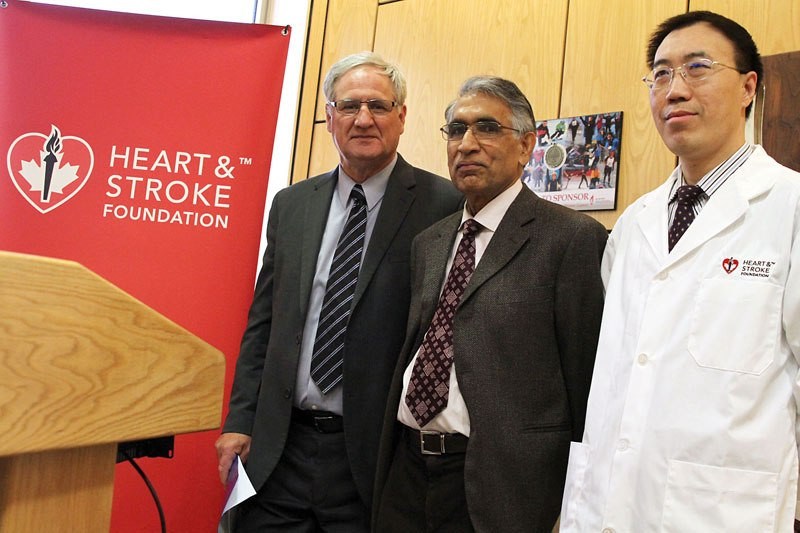Peter Collins' 2011 death brought sadness to his friends and family.
But his generosity could wind up saving hundreds, if not thousands of lives.
In his will, Collins left a substantial sum of money to the local chapter of the Heart and Stroke Foundation, money that will be used to help Lakehead University researcher Guangdong Yang study cardiovascular disease and ways to prevent it from striking.
Yang plans to look at heart disease at the cellular level, particularly the narrowing of vessels, which can be caused either by injury or long-term unhealthy diets, causing stiffness and choking in the veins and making it difficult for blood to flow.
“My research is exploring the protective role of hydrogen sulfide against this kind of blood-vessel narrowing,” Yang said Tuesday at city hall, where the Heart and Stroke Foundation officially announced the grant.
Traditionally known for its rotten-egg odor, hydrogen sulfide is typically thought of as an industrial chemical. But it’s also found in humans, Yang said.
“We know a very small amount of this gas is generated in animal and human cells from certain metabolic processes,” he said. “This process happens in the walls of blood vessels, and is mediated by an enzyme named cystathionine gamma-lyase, or CDE.
“With our study we want to better understand why blood vessels become narrowed and potentially provide new therapies to treat cardiovascular diseases by targeting the CSE/hydrogen sulfide system.”
The study is a collaboration between Lakehead University and the Northern Ontario School of Medicine.
However, Yang said, without the support of donors like Collins, research like his will be hard-pressed to find the money to continue much longer.
“I fully believe that with continued support, we can continue to put our expertise, resources and passion into finding answers, making breakthrough discoveries and making health last for everyone in our community,” he said.
Tara Montieth, area manager for the Heart and Stroke Foundation, said supporting research and awareness is what they do and why they’re glad to help Yang further his research project, which had to be approved at the national level.
“We’re only able to fund about 30 per cent of all the research requests that come to the foundation. So having this major contribution to the pot of funds supporting research is very well received,” Monteith said.
“It needs to be the highest caliber of research. It’s peer-reviewed by the leading researchers in the country.”
Nearly 4,000 people in the Thunder Bay area are hospitalized each year with heart disease and stroke-related conditions, while 17.2 per cent of residents older than 12 have high blood pressure, the No. 1 risk factor for stroke.
